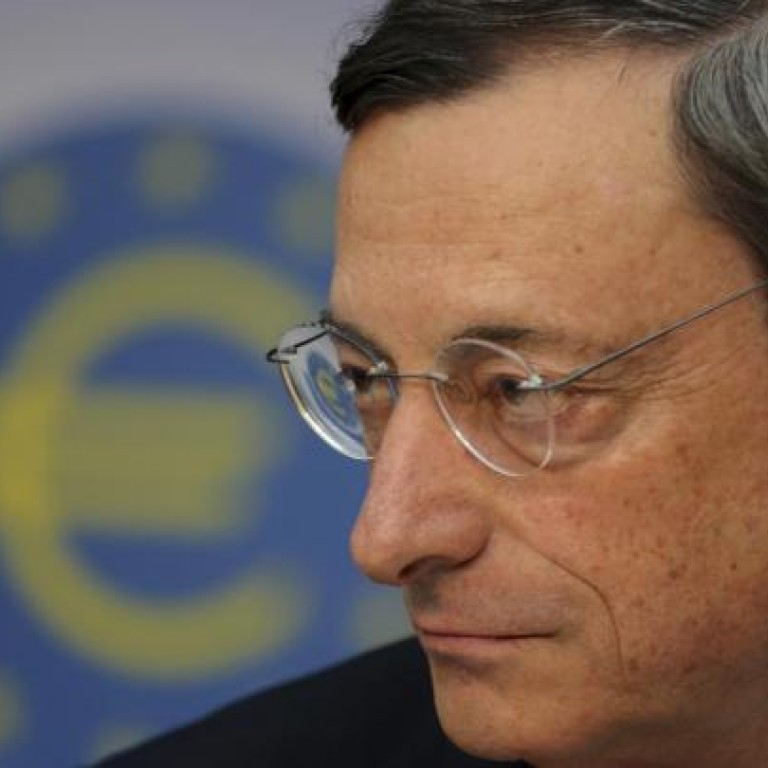
Mario Draghi reverses previous euro policy
Mario Draghi, the ECB president, seems to have sent the global currency bears packing with a determined reversal of his predecessor's ideas
European Central Bank president Mario Draghi is embracing policies dismissed by his predecessor to force euro bears to capitulate.
Since July 26, when Draghi said he would do "whatever it takes" to save the 17-nation euro, the currency has appreciated against major counterparts.
The cost to protect against a default on government debt in western Europe tumbled to a 15-month low and confidence in the region's banking system is improving, with bank stocks surging 33 per cent since June 1, outpacing the 18 per cent gain in the Stoxx Europe 600 Index.
Former ECB president Jean-Claude Trichet kept the central bank from propping up debt-laden governments by limiting purchases of their securities as the almost three-year crisis deepened.
Draghi has done the complete opposite since he took over in November, and his decisions are placing everyone from former International Monetary Fund chief economist Kenneth Rogoff to hedge fund manager Axel Merk on the wrong side of the market.
"It has been a game changer, and Draghi has done the heavy lifting," said Merk, president and founder of Merk Investments in California.
His US$526 million Merk Hard Currency Fund has seen growth of 3.38 per cent in the past month, beating 92 per cent of its peers, according to data.
Draghi, 65, has shown a greater willingness than Trichet to use the ECB's balance sheet to aid Spain and Italy, and he relaxed his predecessor's insistence that senior bondholders at crippled banks should not suffer losses in bailouts.
Merk, who said he was "very negative" on the euro earlier this year because of what he called the dysfunctional process in resolving Europe's crisis, has become a buyer.
"The euro has much higher to go from here, though it's not out of the woods yet," he said.
The euro jumped to a four-month high of US$1.3169 last Friday, before ending the week at US$1.3131. It appreciated 3.7 per cent over the past month against a basket of nine other developed-market currencies, including the yen, pound and Australia dollar, and is the biggest gainer, according to Bloomberg calculations.
What European policymakers "have shown so far is their willingness to support the currency union and do as much as they can", said Mary Nicola, a currency strategist at BNP Paribas.
BNP Paribas has the highest year-end estimate for the euro among 50 strategists in a survey, calling for the currency to strengthen to US$1.35. The euro's lifetime average since it was created in 1999 is about US$1.21.
Rising confidence in Europe is also helping shore up global markets, with the MSCI All-Country World Index of equities surging by 18 per cent since its low this year on June 4.
The Standard & Poor's GSCI Index of commodities is up 25 per cent from its low this year on June 21. Corporate bonds have returned 4.9 per cent since the end of March, including reinvested interest, according to Bank of America Merrill Lynch index data.
Bank stocks in the Stoxx Europe 600 Index have climbed to their highest level since March 21.
Just three months ago bets against Draghi's ability to hold the monetary union together reached record highs.
The difference in the number of wagers by hedge funds and other large speculators on a decline in the euro compared with those on a gain, known as net shorts, was 214,418, the most ever, on June 5, figures from the Washington-based Commodity Futures Trading Commission show.
That amounts to a US$33.4 billion bet against the euro.
Protection against losses on the senior debt of 25 banks and insurers with credit-default swaps rose more than 50 per cent between March and July.
Yields on 10-year Spanish bonds jumped to a euro-era record of 7.75 per cent on July 27 as the nation sought a bailout of its banks.
Rogoff, who is now an economics professor at Harvard University, said recently that while he expected Greece, which held consecutive elections in May and June amid public opposition to spending cuts after undergoing the largest ever sovereign-debt restructuring, to "ultimately" leave the euro, "the real question is what is going to happen to the broader euro?"

